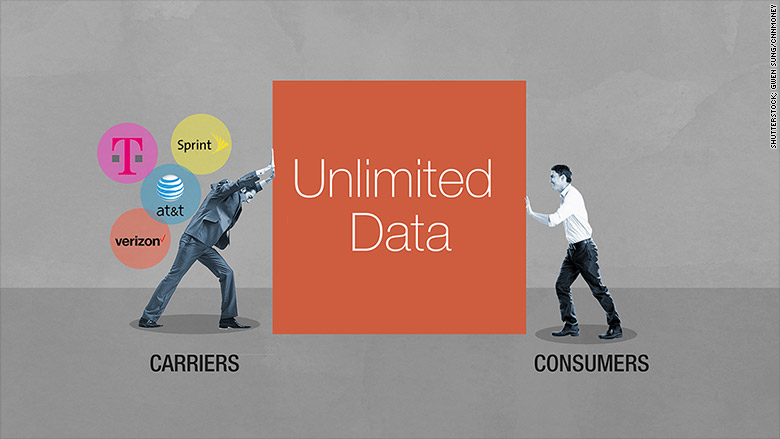
Unlimited cell phone data plans are still alive ... but they're on life-support.
In one form or another, all four major carriers still offer unlimited data plans to their customers. But each of the nationwide cell phone companies has gradually dialed them back.
The slow, painful death of unlimited cell phone data began in 2010. At the time, smartphone owners could download all the video, music, apps and websites they wanted.
But carriers started selling far more smartphones than they ever expected. And customers were downloading huge files on networks designed for phone calls and texts. Congestion was making service quality fall through the floor.
The chokehold
Fast forward to 2015. Each of the four nationwide carriers have ramped up their push back against their unlimited customers.
Sprint: Last week, Sprint announced that it would cap its unlimited data plans at 23 GB. After customers hit that limit, the network will begin prioritizing their download requests after all other Sprint customers, which means they'll have to get in line if they really want to watch that YouTube video.
23 GB is still a whole lot of data, and only impacts 3% of Sprint's customers. But it's a push-back nonetheless.
T-Mobile: Outspoken CEO John Legere went on a tirade against a small fraction of his customers he said are "stealing data" from T-Mobile. He said some customers used software tricks to bypass limits T-Mobile put in place on downloads from mobile hotspots.
The company also has implemented a 23 GB cap on unlimited data, after which T-Mobile prioritizes other customers over the heaviest downloaders.
AT&T: The first carrier to get rid of unlimited plans continues to grandfather in customers who have stuck with unlimited data since 2010.
Like Sprint and T-Mobile, AT&T has a 22 GB cap, after which it slows down speeds for its heaviest users.
But AT&T's policy appears to be harsher than its competitors. The FCC said that AT&T's unlimited customers had been subjected to slower speeds for an average of 12 days -- nearly half a billing cycle. The commission also noted that throttled customers' speeds have been so slow, that they have experienced trouble connecting to mapping services or streaming video.
The FCC fined AT&T $100 million for misleading mobile customers about its unlimited data plans, but AT&T refused to pay the fine. AT&T pledged to take the battle to court.
Verizon: Verizon stopped offering unlimited data to new customers in 2011. But recently, Verizon started to put unlimited data in a sleeper hold.
Grandfathered-in unlimited data customers are about to receive significantly higher cell phone bills. Verizon just hiked the price of unlimited data plans by $20. Now, they cost $50 a month. That's a 67% increase.
A year ago, Verizon abandoned plans to slow down 4G connection speeds for unlimited data plan customers after FCC Commissioner Tom Wheeler openly called the plan "disturbing."
What you can do about it
Even though "unlimited" no longer means unlimited, there are ways to reduce the amount of 4G data you download.
1. Use Wi-Fi whenever possible. Cable and cell phone companies have a huge number of Wi-Fi hotspots, and you can set up your phone to sign into them automatically. Your carrier or broadband provider's website will have instructions.
2. Shop around. If you're not grandfathered in with Verizon or AT&T, Sprint and T-Mobile remain good unlimited data options for the vast majority of customers. If your data usage has never approached 23 GB a month, either option will suit you just fine.
3. Be willing to settle for slower speeds. And if you are looking to save money, T-Mobile's tiered data plans are inexpensive and technically unlimited -- T-Mobile won't charge you overages if you surpass your monthly data limit. But you'll have to suffer through slower speeds.

